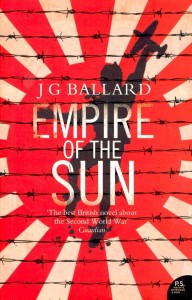 I have to begin by thanking my brother Ken for introducing me to Ballard by shipping a copy of Empire Of The Sun to me across the Atlantic. I was even more grateful after finishing it.
I have to begin by thanking my brother Ken for introducing me to Ballard by shipping a copy of Empire Of The Sun to me across the Atlantic. I was even more grateful after finishing it.
James Graham Ballard was born to British parents in Shanghai in 1930, where he lived in the Shanghai International Settlement – foreigners in a foreign land stubbornly carving out a Western existence – until the Japanese occupation of Shanghai following Pearl Harbour, after which he spent the remainder of the war years in an internment camp with his family and other foreign civilians.
These experiences form the plot of Empire Of The Sun, whose protagonist Jim “Jamie” Graham, a young British boy living with his family in Shanghai, is separated from his parents and must survive the war years alone. Ballard shows us the war through the eyes of a child and we, in turn, see the war’s impact on the child: his growing nihilism, for example, and indifference to death, which has become a reality of his world. Sometimes Ballard makes Jim’s fatalism explicit:
He welcomed the air raids, the noise of the mustangs as they swept over the camp, the smell of oil and cordite, the deaths of the pilots, and even the likelihood of his own death. Despite everything, he knew he was worth nothing. He twisted his Latin primer, trembling with a secret hunger that the war would so eagerly satisfy.
Or “For all his youth, he seemed to be willing himself to the edge of an adult despair.” More interesting, however, is when Ballard evokes this despair, typically by an almost painful juxtaposition of contrasting images: light and dark, death and life, youth and old age. Here, for example, is the opening sentence of the fourth chapter; Jim is preparing to go to school, cheerfully oblivious to the impending Japanese invasion: “A field of paper flowers floated on the morning tide, clustered around the oil-stained piers of the jetty and dressed them in vivid coloured ruffs.” This beautiful image is transformed, by chapter’s end, into something sinister: “Meadows of paper flowers drifted on the running tide, and clumped in miniature floating gardens around the old men and women, the young mothers and small children, whose swollen bodies seemed to have been fed during the night by the patient Yangtze.” Later, after Jim leaves his internment camp for the final time, and finds himself utterly alone, he discards a briefcase carrying some personal items of sentimental value, including a photograph of his parents, thus renouncing the last of his childhood:
He had carried the wooden box all the way from Lunghua, holding tight to the few possessions that he had assembled with such effort. He had been trying to keep the war alive, and with it the security he had known in the camp. Now it was time to rid himself of Lunghua and face up squarely to the present, however uncertain, the one rule that had sustained him through the years of war.
He pushed the case on to the greasy surface. In the last moments of the dusk the dead water came alive with roses of iridescent colour. As the box floated away, like the coffin of a Chinese child, the circles of oil raced to embrace it and sent tremors of light across the river.
Death and life, light and darkness coexist; even the imagined coffin belongs to a child, forcing the contrast. And yet there is something optimistic this time, something, at least, life-affirming: the water comes alive, its murkiness transformed into something radiant.
I won’t say Empire Of The Sun ends on an affirming note. China, we are told, will one day “punish the rest of the world, and take a frightening revenge” for the indignities they suffered. Jim, even on the verge of rescue, cannot escape his fatalism: “He had failed to grasp the truth that millions of Chinese had known from birth, that they were all as good as dead anyway, and that it was self-deluding to believe otherwise.” And the image of the floating flowers returns in the novel’s final lines: “The flowers formed a wavering garland around the coffin as it began its long journey to the estuary of the Yangtze, only to be swept back by the incoming tide among the quays and mud-flats, driven once again to the shores of this terrible city.” The reader can only surmise that Jim will find Shanghai and the events of the war as inescapable as these floating garlands lost in the tides.